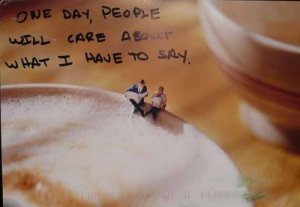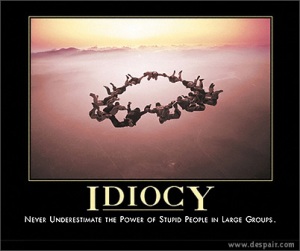Seldom do we hear history documented in such cutthroat language. It’s not exactly a breath of fresh air but it’s a refreshing read—a romantic read at that. The triumphs of humanity over time and space so cryptically titled as “Internet Apocalypso”.
It’s so easy to feel lost in cyberland. The world is not getting bigger—at least not geographically—but it feels like it. The objective was to actually make it smaller. People realized that indeed, there was a world outside us but the world inside us, was bigger, and even more, unexplored. We wanted to know what other people thought about us and about themselves.
As James Dean was a Rebel Without A Cause, we were rebels without a clue. And our cause was an answer. No longer were we seeking authorization to learn new things. We figured that we owed that to ourselves—to humanity.
Contrary to how people put down the Internet, and other forms of technology, as crippling the human touch, I say it is an evidence of our humanity: the need to be comforted by the thought that there’s someone out there, out of the billions of people who traverse the earth, who will understand.
Like bacteria to heat, we thrive in anonymity. We worked so hard to have voices yet we are empowered by the thought of having that nameless voice. As long as it was out there, someone will hear it—or read it. And somehow, it was enough to be known as Blogger007.
And who did not gush at this line? “So what did we come for? And the answer is: each other”. Admit it. You did, didn’t you?
Markets are indeed conversations not cold, quiet transactions. How else can you expect to sell that delicious cake, if you can’t convince people it won’t make them fat? We want to have our cake! And we want to eat it too! Products can’t be shoved into people’s faces hoping that they dream about it and wake up actually purchasing it. It was a courtship that began with a conversation. And listen, we’re still talking—conversing.
Mass marketing, standing in the same line and looking like and wanting the same thing as the person behind you, led people to jump off the bandwagon. Individuality is the new currency of the world—or at least people didn’t want to believe that they were just like everyone else. Thus, the rebellion.
Competition breeds creativity, as evidenced by the huge corporations holding their breath with the emergence of micro markets under their noses. It was what Christopher Locke referred to as gonzo business management—paradox turned into paradigm. The crazy ideas of yesterday are now fueling the markets of today. We have become the inspiration.
Soon enough, people learned to protect what they knew, as they were also protecting what they have. Because apparently, what they knew could either build multimillion corporations or become the downfall of one. Quoting the late Ernie Baron, however cliché it may sound, knowledge IS power. And more often than not, that power resided in the so-called inhabitants of corporate basements, rather than with the finger-tapping and head-nodding bosses. Not to undermine the power of authority that resided with those who have earned the titles, they did actually do something. Thus with emergence of the internet also came the dawn of intranets, walls, passwords, security certificates and the list goes on. They thought of everything to keep the lines from blurring.
Then finally, there was a call to get serious about business. Surprise, the markets speak up, again, echoed by the corporate basement residents:
Relax. Get a little humor.
Don’t wall us out. Let us in.
There’s something we need to tell you. There’s something you need to hear.
And the conversation goes on.
The story of how everything came to be is a story of colorful characters who managed to keep themselves grey: the markets and the corporations. We cannot point out the protagonists and the antagonists because we’ve yet to reach the end of this corporate fairytale. Soon, my OrCom batch mates and I will make that fateful leap to what tomorrow has prepared for us what we have prepared for tomorrow, so we shall just see from there.
………………………………….
We seem to always want something more.
We seem to always want it to last a little longer.
Insatiable creatures, aren’t we?
Hats off to humanity!
//Here’s to the Crazy Ones by Jack Kerouac
Here’s to the crazy ones.
The misfits. The rebels.
The troublemakers. The round
pegs in the square holes – the
ones who see things differently.
They’re not fond of rules and
they have no respect for
the status quo. You can praise
them, disagree with them,
quote them, disbelieve them,
glorify or vilify them.
About the only thing that you
can’t do is ignore them.
Because they change things.
Here’s to the crazy ones—the former rebels without a clue.





Comments for the Week #2
Posted in Comments for the Week, Organizational Communication with tags Comments, OrCom, Organizational Communication, UP Manila, Wikinomics on July 12, 2009 by Lou OrtizHello universe!
This series/category “Comments for the Week” will document the LoudUser’s loud mouth. To put it in more acceptable (and more me) terms, these are my comments on my OrComates blogs. Basically, I’m doing this so I can keep track of my comments.
😛
Here’s my take on:
Sir Barry’s Mirroring Iran
Nash Albacea’s Second Stop Wikinomics
Jeanne Rivera’s They Say Sex, I say Intercourse
Paula Batalla’s More. More. And more.
Jona Atienza’s The Ride
Dasi Guevara’s On Internet Apocalypso
Jena Lariza’s Confessions of an Ugly Duckling
Bianca Cruz’s Identity
Ace Acosta’s My Question on Stigma and Communication
Wynne Valenciano’s Rethink, Redo, Restart
Kervi Maximo’s Globally But Not Locally
Arven Eusebio’s Aleck Bovick vs Twitter
P.S. Some of my comments are still “awaiting moderation.” 😦
Leave a comment »